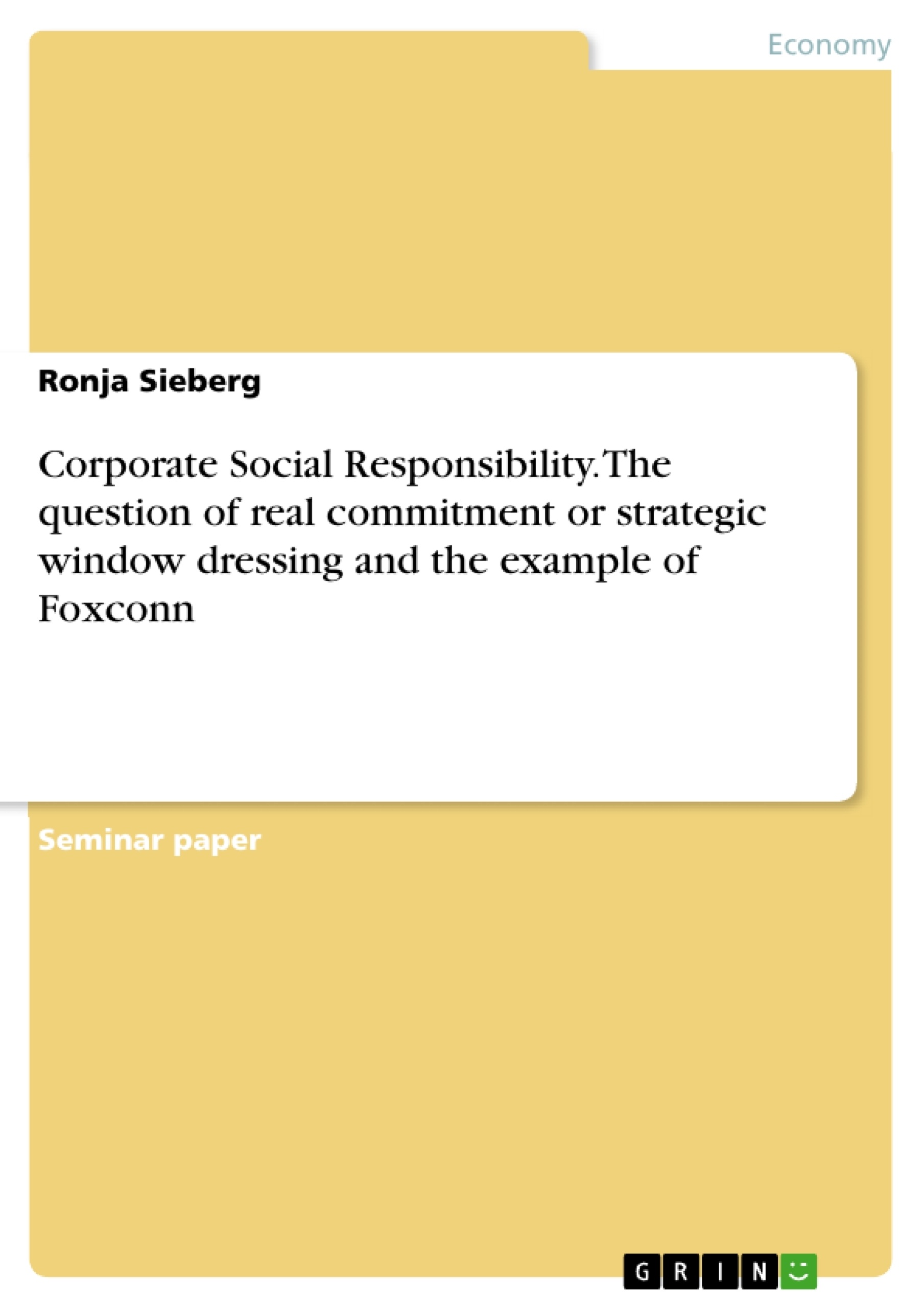The concept of Corporate Social Responsibility (CSR) becomes more and more important, as overcoming “the increasing environmental and social problems is one of the biggest challenges of this century”. Over the last years the discussion about the duty of companies to assume responsibility for society is well underway. Not only in executive boards, politics or science the concept in gaining in popularity, also the media addresses the subject with increased regularity and presents responsible companies with its management approaches.
On the other hand, hardly a day will pass without having to deal with headlines of large organizations who have crossed borders of business ethical behavior and moral acting. One example is the electronics manufacturer “Foxconn”, one of Apple’s former suppliers and a big player in its branch: 2010, the suicides of 18 young employees, as a result of the bad working conditions at the Foxconn factory plants in China, shook the employer giant and the international community.
The illustrated dichotomy is a matter for reflection and therefore well suited for the present seminar paper. The following pages now then deal with the these main questions:
- What is the purpose of CSR and is it suitable for the intention of business?
- Do companies use CSR only as a calculated strategy to survive in this complex
marketplace? If so – is this morally right?
- How much worth do the CSR promises of companies in terms of today’s times
of globalization and growing competition actually have?
The first chapters will give an overview on CSR as a theoretic basis for the following pages, referring to different concepts and definitions that exist.
After that, chapter 3 deals with the applied example of Foxconn. First there will be given some facts and figures about Foxconn and the occurrences in the year 2010 in particular. In the next step the CSR activities will be shortly analyzed in order to contrast the applied CSR intention of Foxconn and the actual outcome.
Inhaltsverzeichnis (Table of Contents)
- 1 Introduction
- 2 What is Corporate Social Responsibility?
- 2.1 Scientific approach
- 2.2 Definition by the EU Comission...
- 2.3 Corporate Social Responsibility and business
- 3 Applied example
- 3.1 Introducing Foxconn
- 3.1.1 Foxconn - Facts & Figures
- 3.1.2 Foxconn scandals
- 3.2 Analysis of Foxconn's Corporate Social Responsibility activities
- 4 Discussion
- 4.1 Corporate Social Responsibility - Nothing but empty rhetoric?
- 4.2 Ethical reasoning
- 4.2.1 Deontological view
- 4.2.2 Consequentialistic approach
- 4.2.3 Virtue Ethics
- 5 Conclusion
Zielsetzung und Themenschwerpunkte (Objectives and Key Themes)
This seminar paper aims to explore the concept of Corporate Social Responsibility (CSR) and its application in the context of the electronics manufacturer Foxconn. The paper analyzes the theoretical foundations of CSR, examines Foxconn's CSR activities, and discusses the ethical considerations surrounding the company's practices.
- Defining and understanding the concept of Corporate Social Responsibility (CSR).
- Analyzing the relationship between CSR and business objectives.
- Examining the case of Foxconn and its CSR activities.
- Exploring ethical perspectives on CSR, including Deontology, Consequentialism, and Virtue Ethics.
- Considering the potential for CSR to be used strategically rather than genuinely.
Zusammenfassung der Kapitel (Chapter Summaries)
- Chapter 1: Introduction: This chapter introduces the topic of Corporate Social Responsibility (CSR) and its growing importance in today's world. It highlights the contrasting perspectives on CSR, emphasizing the importance of ethical behavior in business.
- Chapter 2: What is Corporate Social Responsibility?: This chapter explores the various definitions and approaches to CSR, highlighting the lack of a single, definitive understanding of the term. It delves into different scientific perspectives, including the instrumental approach, political theories, and integrative approaches.
- Chapter 3: Applied example: This chapter focuses on the case of Foxconn, a major electronics manufacturer and former supplier to Apple. It provides an overview of Foxconn's operations and the scandals surrounding its working conditions, setting the stage for an analysis of the company's CSR activities.
- Chapter 4: Discussion: This chapter delves into a discussion of the ethical dimensions of CSR, examining the arguments for and against the effectiveness of CSR initiatives. It explores different ethical perspectives, including Deontology, Consequentialism, and Virtue Ethics, to analyze the moral implications of corporate social responsibility.
Schlüsselwörter (Keywords)
The main keywords and focus topics of this seminar paper are Corporate Social Responsibility (CSR), business ethics, stakeholder management, ethical reasoning, Deontology, Consequentialism, Virtue Ethics, and the applied example of Foxconn. The paper explores the complexities of CSR and its implementation in a globalized business environment, considering the ethical implications of corporate decisions and the potential for CSR to be used strategically.
Frequently Asked Questions
What is Corporate Social Responsibility (CSR)?
CSR is the concept of companies assuming responsibility for their impact on society and the environment beyond legal requirements.
What happened at Foxconn in 2010?
The suicides of 18 young employees due to poor working conditions at factory plants in China drew international attention to the company's labor practices.
Is CSR often used as "strategic window dressing"?
The paper discusses whether companies use CSR as a genuine commitment or merely as a calculated strategy to improve their public image.
Which ethical theories are used to analyze CSR?
The study explores CSR through the lenses of Deontology (duty-based), Consequentialism (outcome-based), and Virtue Ethics.
How does globalization affect CSR promises?
Increased competition and global supply chains make it harder to verify CSR claims, raising questions about their actual worth in today's marketplace.
- Quote paper
- Ronja Sieberg (Author), 2016, Corporate Social Responsibility. The question of real commitment or strategic window dressing and the example of Foxconn, Munich, GRIN Verlag, https://www.grin.com/document/340716



